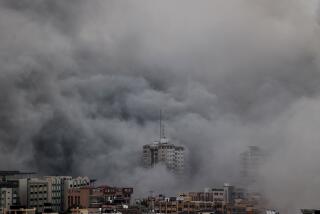Helping Their Homeland, One Girl at a Time
- Share via
There is something alluring about the simplicity of Fiza Shah’s work. Teach a girl to read. It sounds simple enough. But in that act are the seeds of revolution.
Shah and the other founders of Developments in Literacy say that education is the key to reform in their native Pakistan: the first step in lifting that country from Third World status. More than 100 million Pakistanis are illiterate, and two of every three Pakistani girls lack formal schooling. The number is worse in rural areas.
“The literacy rate in Pakistan is so low,” said Hashmat Saeed, a Long Beach resident and the organization’s treasurer. “We wanted to give something back to the country where we were born.”
In 1997, Shah, Saeed and 11 other women, all born in Pakistan and now Southern California residents, decided that the best way they could help their homeland was to help its girls. They established the literacy group to take education to girls in the countryside.
For five years, they have worked and watched as their dream has become reality. The organization, once run out of members’ homes, now runs offices in Los Angeles and Islamabad. Affiliate chapters have sprung up in six U.S. cities and in Singapore. More than 10,000 girls have walked through the doors of the group’s schools.
This week, Shah, a Long Beach resident who has lived in the United States for 22 years, is traveling in Pakistan, visiting all of the organization’s 151 schools and overseeing plans to open 40 more. “When you really are doing hands-on work, you have to go there yourself and see it to understand,” said Shah, 42, who credits a family that honored charitable service for her sense of obligation to Pakistan’s girls.
There are many reasons, Shah continued, why parents -- fathers, especially -- try to prevent daughters from attending school. The girls are needed to do housework. They are to be married (rural Pakistanis girls are often pledged to marry between the ages of 11 and 13).
So the Developments in Literacy staff working in Pakistan employs a tactic that has served it well: Find a prominent village elder and convince him of the positive effects of educating a girl. If you convince him, Shah said, the parents might follow his example.
Educated women, she said, bring in money for their family. The literacy group’s teachers are usually local residents with 10 to 14 years of schooling. Once these women start earning salaries, friends and families no longer see them as a burden.
“They are helping out the family, and the whole dynamic changes,” Shah said. Girls whose parents can barely afford to feed them now dream of becoming teachers or doctors. “We have found a tremendous change in the mentality of the girls,” she said. “And that’s how you start.”
Shah, the daughter of a Pakistani diplomat and the mother of two college-age sons, carries her own images of education and transformation, stored on a sleek laptop computer that accompanies her on her travels.
Earlier this month, she sat in the ornate dining room of her Long Beach home, tapping away at keys until a photo appeared.
“Here,” she said, turning the screen. An image appeared, of a bare one-room classroom. A group of girls sat cross-legged on the floor, perched on straw mats.
But the rudimentary conditions were not the reason Shah had chosen the photo. She pointed at the girls. “Look at these faces,” she said.
And that’s when the girls came into focus: They were all smiling. Their bright eyes and rosy cheeks seemed to brim with enthusiasm for their teacher and their classroom.
The women of Developments in Literacy use such images and stories, in conversation and on the group’s Web site, www.4dil.org, to illustrate their mission and attract potential donors. “Once they see what we are doing and hear about the kids, and see the pictures, the videos,” it is easy to ask for money, said an Orange resident, Perveen Ali, vice president of the organization’s Los Angeles chapter.
“Even my mother is involved in it. She [funds] a school there -- wants to know how she can improve the building for the kids,” she said.
Developments in Literacy is in many ways an easy sell, thanks in part to a strong U.S. dollar and inexpensive Pakistani overhead. Forty dollars will send a girl to school for a year. Funding an entire primary school for a year costs $1,000. Girls receive their education free -- though often, Shah said, families are asked to contribute 5 rupees a year (about 8 cents).
“That’s as much as it costs for a cup of tea,” Shah said of the charge, which is imposed more as an incentive to continue a daughter’s education than to cover costs. “If that pinches them a slight bit,” she said, “they make sure the girls go.”
Although most of the group’s $350,000 budget is raised from family and friends, the organization has begun seeking long-term grants. The Levi Strauss Foundation has contributed. So too has NetAid, a New York-based nonprofit organization, which gave $53,000.
Developments in Literacy leaders are talking with the Pakistani government about helping some state-run schools. And they hope to establish a nutritional program that would feed girls before school.
That’s one project that excites Ali, the vice president of the Los Angeles chapter. “Here we take so much for granted,” she said. “I end up telling my kids, ‘Don’t throw any food away.’ ”
Ali is planning a trip to Pakistan next summer with her children -- two boys and a daughter -- so they can see what their mother’s hard work has accomplished and what they have gained by being raised in the U.S.
“With all the events that are happening in the world, you feel every little bit you can contribute is worth it,” Ali said.
“I have lived here so long, I can’t imagine. What if I had been back there?”
More to Read
Sign up for Essential California
The most important California stories and recommendations in your inbox every morning.
You may occasionally receive promotional content from the Los Angeles Times.










